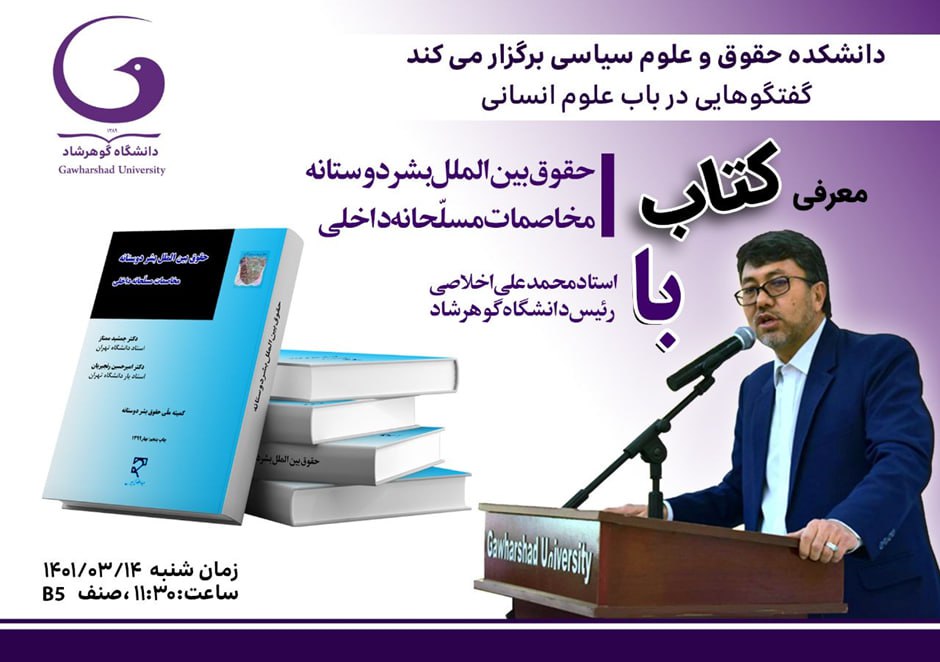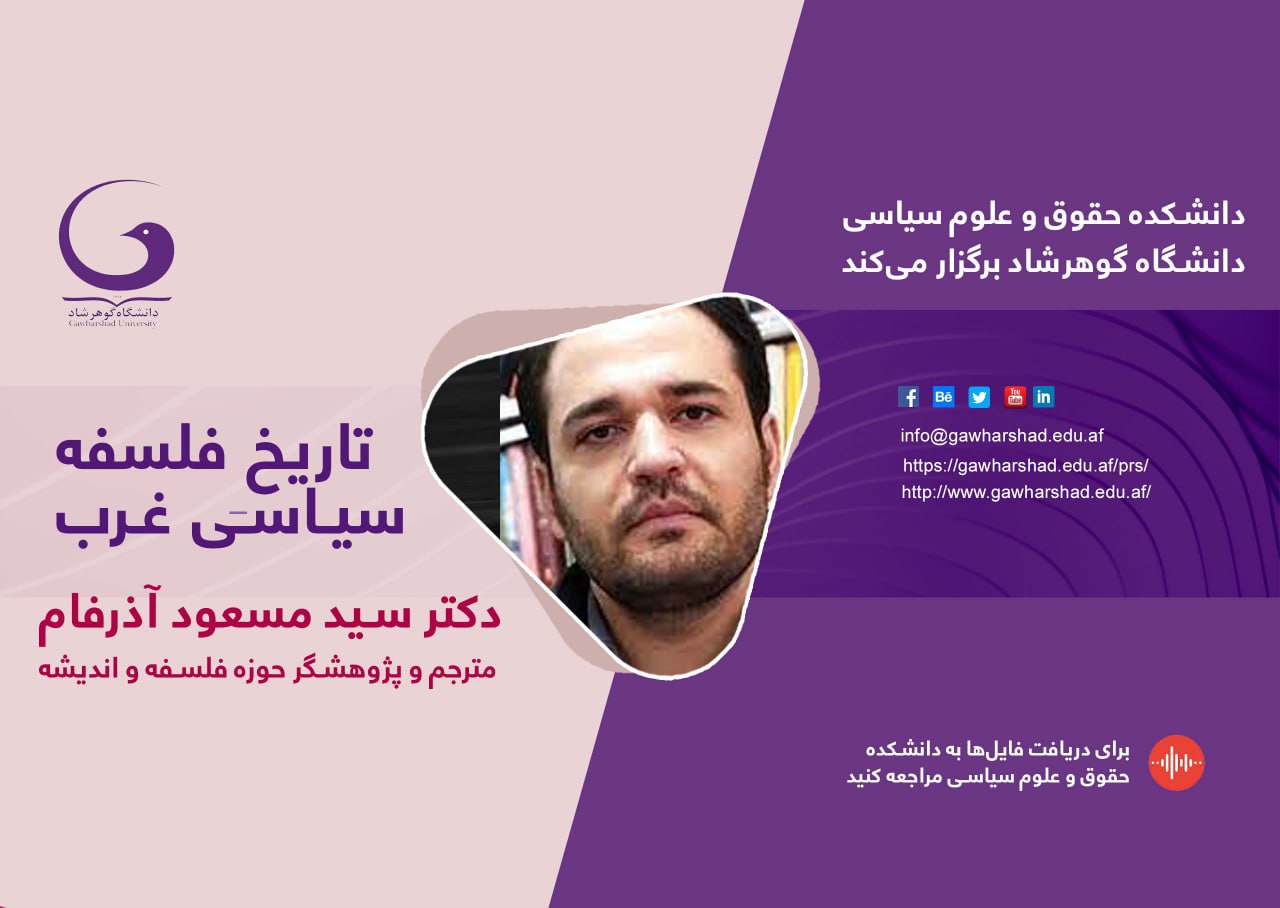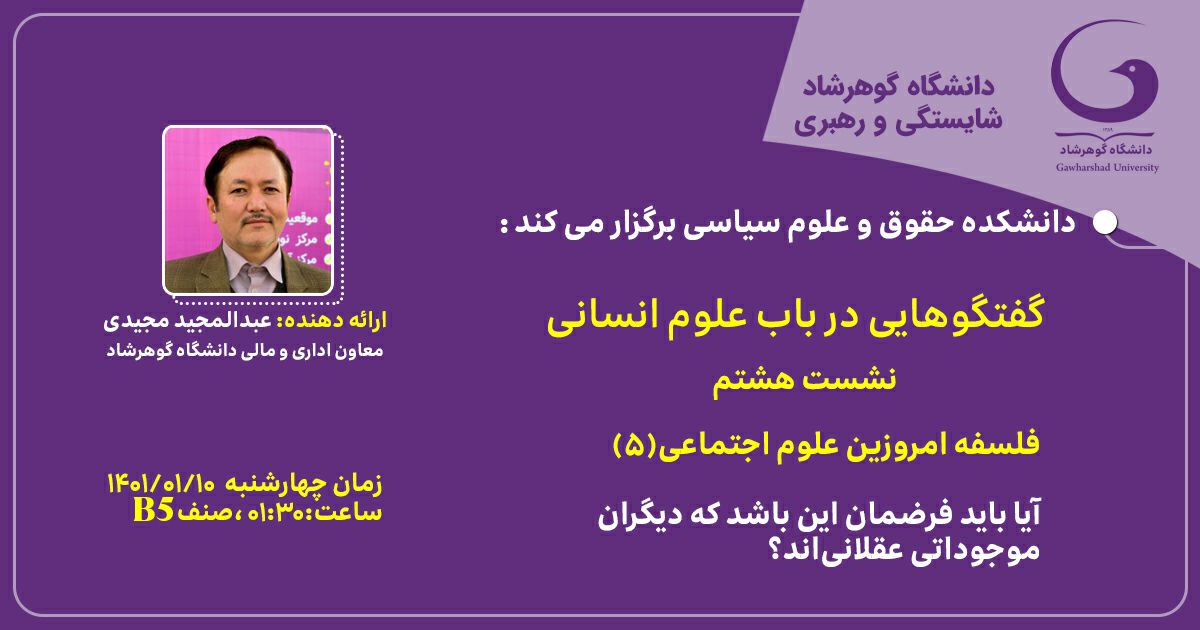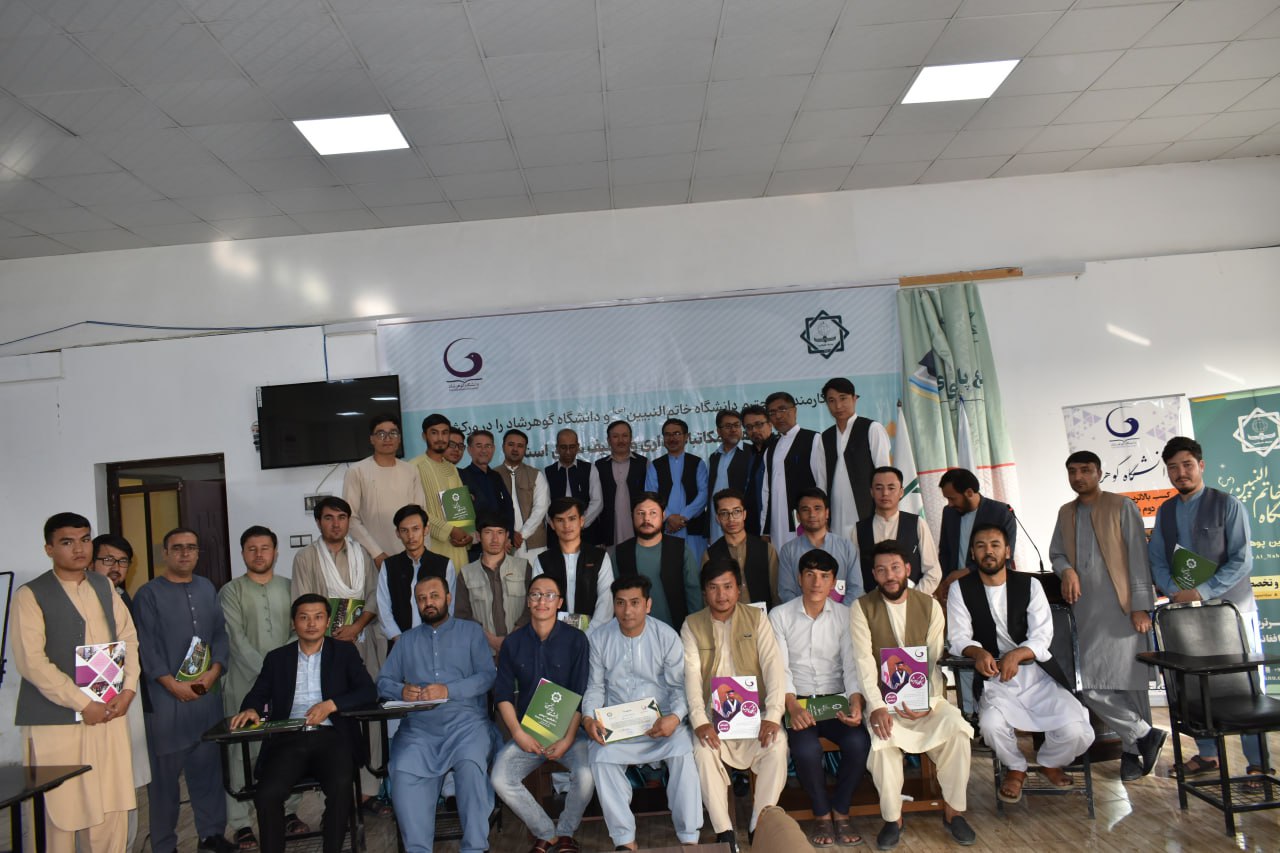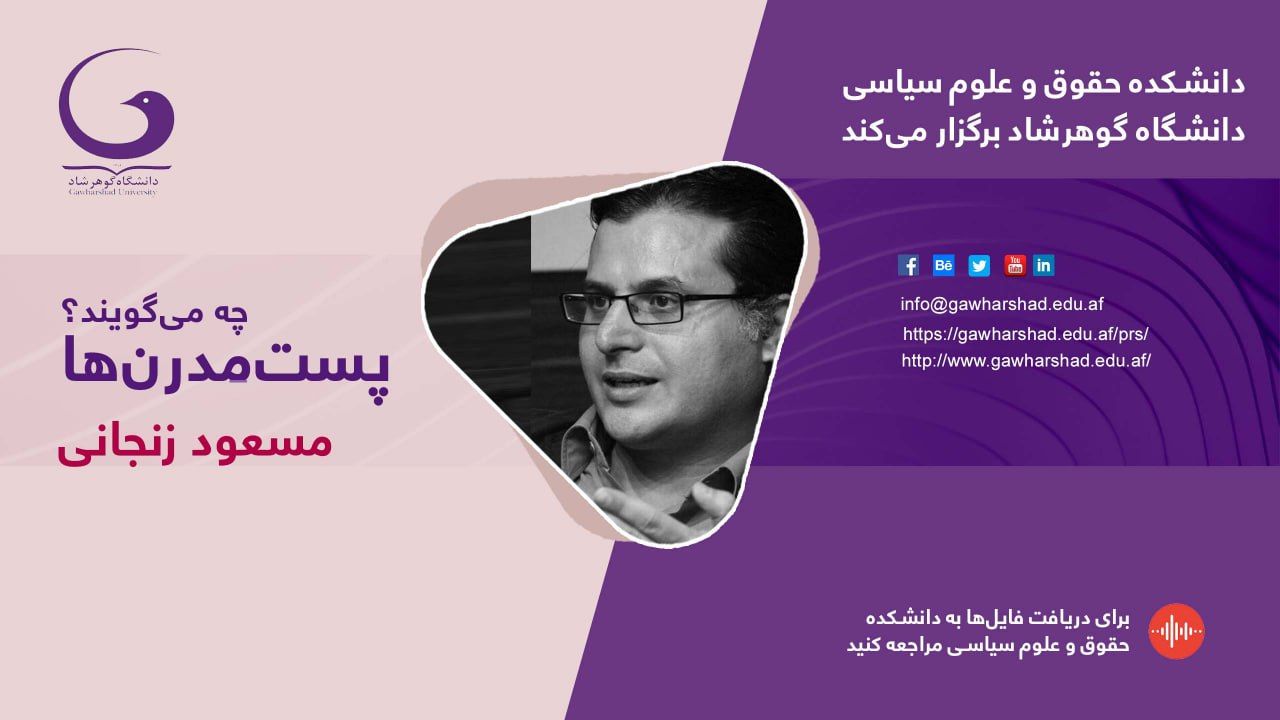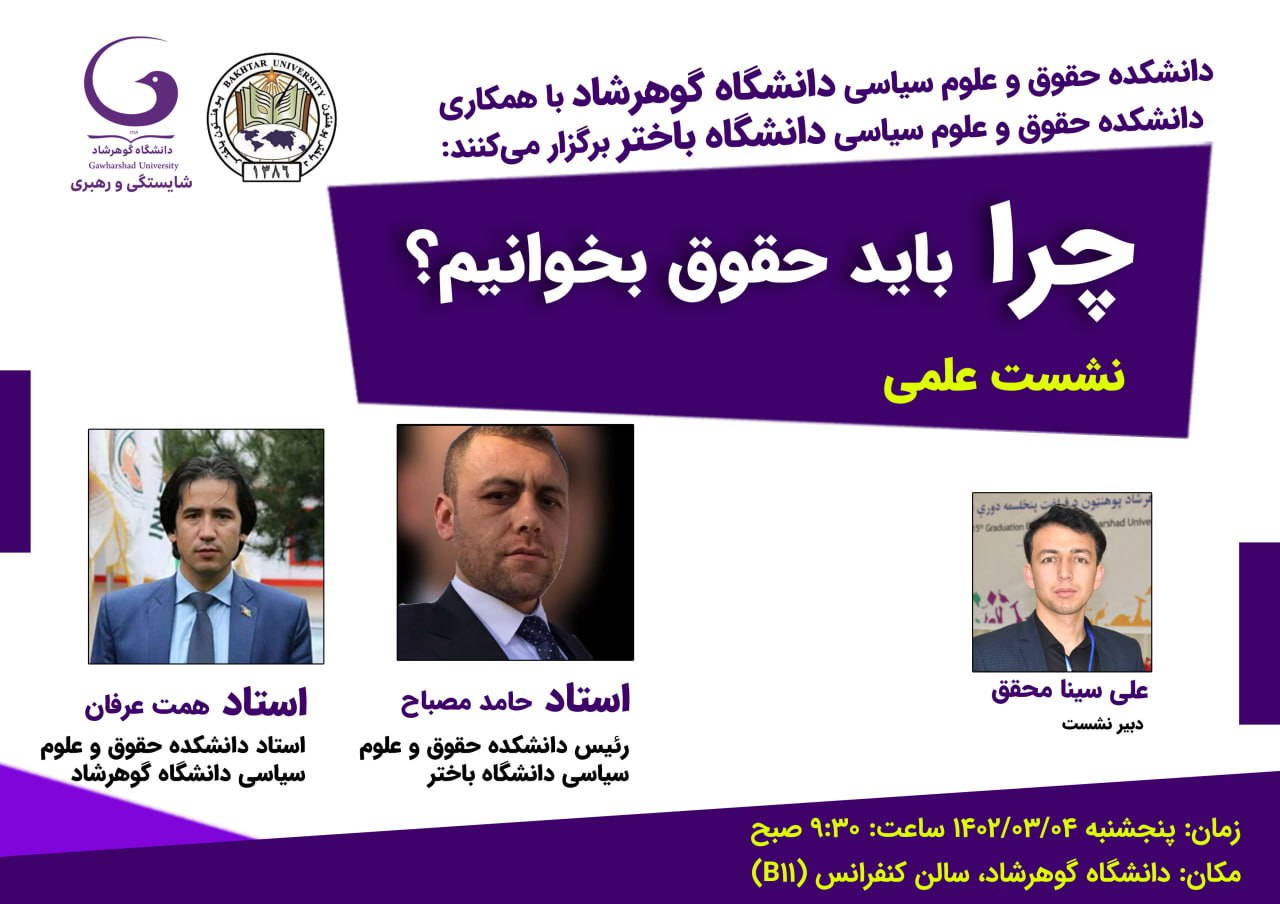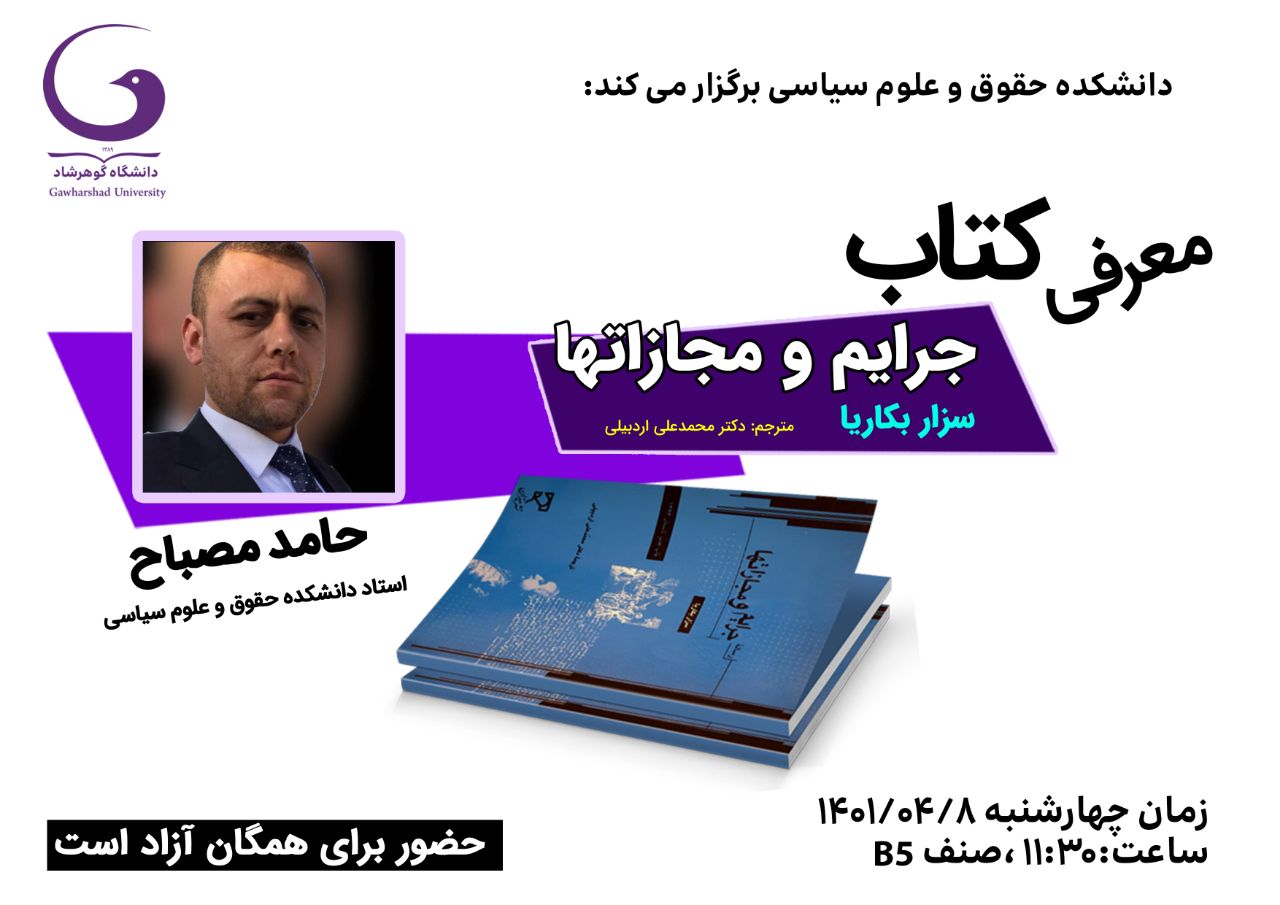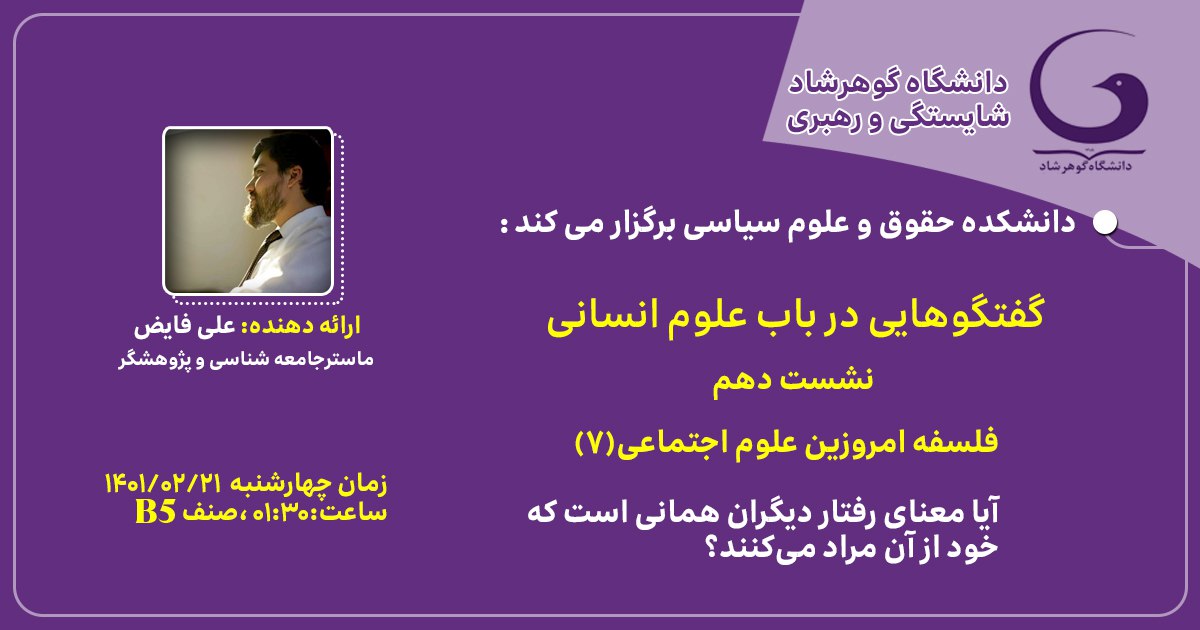All News
Conversations in the field of humanities; Introduction to a book. In this session, Dr. Mohammad Ali Akhlaghi, the president of Goharshad University, introduced one of the important and necessary books for law students, emphasizing the importance of books and reading.
Introduction of the book author: The author of the book, Dr. Jamshid Motaz, is one of the most famous international lawyers. While being a professor at Tehran University, he also has teaching experience at Sorbonne, Caen, and Grenoble universities in France, as well as Geneva University, Columbia University, and universities in the United Arab Emirates. He was also selected to teach at The Hague Academy of International Law. Being a legal advisor to the International Red Cross Committee and a member of the editorial board of the International Human Rights Yearbook in Holland are other parts of his academic resume. He is fluent in both French and English and was a member of the International Law Commission from 2000 to 2006 and served as its chairman in 2005.
B) Introduction to the book chapters: This book is organized into four chapters. The first chapter discusses the sources of human rights in armed internal conflicts, the second chapter describes various types of armed internal conflicts, the third chapter focuses on the obligations of conflicting parties in armed internal conflicts, and finally, the fourth chapter deals with implementing human rights in armed internal conflicts.
c) The situation of human rights in internal armed conflicts: Internal wars have always been considered an internal matter of countries, and governments have always tried to maintain this status quo. Given that both international law makers and followers of international law are states, they were not willing to extend the scope of human rights within their territories. Therefore, international documents in this regard are limited. For example, while there are over 600 legal provisions regarding international armed conflicts, there is only one common Article 3 and a second Additional Protocol related to internal armed conflicts. This situation has led to the formation of two separate systems in the field of human rights.
d) Developments resulting from the development of human rights and the inclusion of internal armed conflicts in it:
1. Development of the concept of non-state armed threats and a new interpretation by the Security Council.
2. Establishment of international and regional criminal courts.
3. Recovery of customary law.
4. Importance given to judicial procedures.
5. Transformation in the position of individuals in international law.
6. Transformation in the concept of sovereignty.
In order to promote the practical, scientific, and societal concepts needed by the academic community of the country, the Faculty of Law and Political Science at Goharshad University provides lectures from prominent professors around the world in the form of audio files, free of charge, for interested individuals. To obtain lecture files, please visit the Faculty of Law and Political Science.
In this session, Professor Abdolmajid Majidi, the administrative and financial deputy of Goharshad University, referring to previous sessions on the philosophy of contemporary social sciences, said that the book "Philosophy of Contemporary Social Sciences" can contribute to tolerance and accommodation in society. He stated that the philosophy of contemporary social sciences points out that social life has extensive dimensions and each society can form a cohesive and harmonious community by accepting and resolving these dimensions. He further discussed the notion that we should assume others are rational beings, stating: Considering the general theme of this book and the culture of sociology, it must be said that every behavior has a purpose, and these purposes should be understood based on the intention and motive of the actor. Referring to Weber's discussions on understanding others' behaviors, he emphasized the need to comprehend others' behaviors. On the other hand, he addressed hermeneutical interpretations, stating that if we interpret others' behaviors in this framework according to Gadamer's interpretation, it would lead to a perception that their behavior is something they did not intend. Finally, he referred to a chapter in this book and concluded that the answer to this question is that others are rational beings.
In line with the adaptation of the Memorandum of Understanding between Goharshad University and Khatam al-Nabieen University, a joint workshop on programming and administrative correspondence methods was held on September 23, 2023, to enhance the capacity of human resources of both parties. In this program, attended by employees from both institutions, Dr. Mohammad Ali Akhlaghi, the president of Goharshad University, emphasized the importance of technology growth and skill development as serious and necessary needs for collaborative actions between educational institutions. Furthermore, Professor Assadullah Baturi explained various methods and types of program development for participants in relation to the topic "Program Development Methods". Associate Professor Zabir Azimi, the dean of the Faculty of Administration and Public Policy at Kabul University, also analyzed and described various administrative correspondence methods for the audience. Organizers: Faculty of Economics and Management at Goharshad University and the Development Center for Professionalism and Public Relations Affairs at Khatam al-Nabieen University.
In line with promoting the modern and practical concepts as much as possible, the Faculty of Law and Political Science provides free access to lectures by prominent professors for interested individuals.
Why should we study law?
Faculty of Law and Political Science, Goharshad University. By holding a session as part of the sessions on humanities in collaboration with the Faculty of Law and Political Science, Bakhtar University, the topic of the philosophy of studying law was discussed. In this session, Mr. Hamed Mosbah, the dean of the Faculty of Law and Political Science at Bakhtar University, stated: The foundation of any system is based on law. It is law and rights that make us aware of our own rights and those of others and provide a basis for justice to be implemented. He emphasized the importance of this topic by referring to the historical development of law. Furthermore, Professor Hemmat Erfan mentioned that studying law has various career opportunities as it enables one to defend their own rights and those of others under any circumstances. For example, defense lawyers have a completely legal profession and only those who have studied law can work in this field or write legal pleadings, which are essential components in courts. In conclusion, they emphasized that society cannot function without comprehensive laws and that these laws are the foundation upon which everything is built.
Faculty of Law and Political Science book introduction
In this meeting, from this series of meetings, the introduction of the book; Crimes and Punishments from Caesar Bekaria, translated by Dr. Mohammad Ali Ardabili, was done by Professor Hamed Misbah, one of the professors of the Faculty of Law and Political Sciences of Gohar Shad University. In this meeting Professor Misbah said that:
This small but valuable treatise was written by Cherzbon Sanabkaria (Sezra Bekaria), a famous philosopher of the 18th century, and was translated into Persian by Dr. Mohammad Ali Ardabili. Since both the author and the translator of the book do not need to be introduced, especially for legal scholars, taking this opportunity, in connection with the present translation and the importance of the book, we briefly mention the important points that were mentioned in the program as follows. become
This book consists of an introduction and forty-two chapters: the first chapter contains the introduction of the author, the second chapter deals with the origin of punishments and the right to punish, in the fourth chapter the author deals with a very important issue, which is the interpretation of laws. And in the same way, in chapter 12, the author sufficiently discusses torture and obedience; The 13th chapter contains important issues related to the procedural law, the discussions of which today form the basis of the criteria of a fair trial.
- The principle of the legality of crimes and punishments is one of the most basic topics of this book, which after the French Revolution found its first reflection in the eighth principle of the Declaration of Human Rights of 1789, and after that it was adopted by the legislatures of European countries as one of the principles of the criminal law. and until today its importance is emphasized by criminal lawyers
In this book, the author has discovered principles that have revolutionized the criminal justice system; In other words, it can be said that: this book has formed the basis of modern criminal law, because in this book, by maintaining brevity and simplistic writing, Bekaria has dealt with topics that were not the same in the past and are among the issues discussed today in the field of criminal justice and compliance the rights of the suspect and the accused;
- At the same time, the present book was translated into all common languages in Europe, and until now, many explanations and explanations have been written about it;
- The Farsi translation of this book was done by Dr. Mohammad Ali Ardabili, one of the able and skilled professors of criminal law. In this translation, the professor has also used the most important previous translation and explanations in order to clearly convey the author's purpose to the reader.- This work of Shamand ends with a brief and valuable conclusion, which I will end this report by quoting directly, "In order for the offense of one person or several persons against a specific citizen not to be considered a crime, it must first of all be public, quick In special circumstances, it should be as mild as possible, in accordance with the crimes and according to the law."
In this session, Mr. Fayez Ahmadi started the discussion by summarizing the previous chapters, emphasizing that the content of the book is continuous and interconnected. He continued the discussion by questioning whether other people's behavior is what they intend. The intentionality was raised as a topic, and for example, they referred to the night of December 49 BC and mentioned that Caesar crossed the Rubicon with one of his legions. The Rubicon was a small river between Italy and a province that Caesar ruled over. What was the meaning of this action? From the perspective of cultural authenticity, questioning the meaning of others' behavior is one of the first questions that should be asked. To answer this question, we need to understand meaning. That is, when questioning what is meant by Caesar's action, what should be asked? The meaning of a text or relationship is what the agent or author had in mind when engaging in that action or producing that text or relationship. Intentionality has an explanation for the most specific form of meaning, linguistic meaning. One of the most influential accounts of intentionality can be found in linguistic theory proposed by Paul Grice. According to this theory, in order for someone to intend a certain meaning by uttering a sentence, they must have the intention to have an effect on their audience with that sentence. Mr. Fayez then referred to different meanings in language and discussed Gadamer's hermeneutics and said that interpretations are all mixed with interpretation in humanities sciences when one person interprets another person's behavior.
But in response to the question of whether behavior means what others intend, both intentionalism and Gadamerian hermeneutics want to give exclusive answers. Intentionalism gives a positive answer to this question, while Gadamerian hermeneutics gives a negative answer. However, both of these answers are simplistic. The meaning of behavior can be related to its intentionality in the past and its current significance. The best answer is both yes and no. According to one interpretation, the understanding that agents have of intentions is determinative, and according to another interpretation, it is not the intentions of agents but rather their subsequent importance and implications that are vital.
University Goharshad has always strived to sign agreements in line with the development of the capabilities of professors, students, and staff, as well as the transfer of scientific, educational, research, cultural, administrative, and technological experiences with national and international organizations. For this purpose, on September 9th, 2023, a memorandum of cooperation was signed between University Goharshad and Khatam al-Nabieen University (PBUH) in the fields of science, education, research, and culture. In a meeting attended by Dr. Mohammad Ali Akhlaghi, the esteemed president of University Goharshad and Dr. Abdolkarim Eskandari, the academic-educational deputy of Khatam al-Nabieen University (PBUH), the following objectives were emphasized in the text of the memorandum:
1. Joint cooperation to achieve capacity enhancement programs for professors, employees, and students and to enhance scientific capabilities.
2. Providing opportunities for students to benefit from the experiences of experts from both sides in accordance with their principles and regulations.
3. Developing bilateral scientific, cultural, and professional relationships between Goharshad University and Khatam al-Nabieen University (PBUH).
4. Expanding educational and research collaborations between Goharshad University and Khatam al-Nabieen University (PBUH).
5. Mutual utilization of each other's capacities and facilities.
In the continuation of the series of sessions, in the fourth session, the first chapter of Brian Fay's book "Contemporary Philosophy of Social Sciences", translated by Khashayar Deyhemi, was discussed. This session was held with the presence of Dr. Seyed Mohammad Taghi Hosseini, the head of the Faculty of Law and Political Science. The topic discussed in this session was whether one must be the same person (or one of those people) in order to know that person. In this session, Dr. Hosseini emphasized the importance of this book in creating a new understanding of political and social relations. We have often heard that unless you become a father or a mother, you don't understand what it means to be a father or a mother! Do we really have to become Hitler in order to know what Hitler did in Germany and Europe? This question brings us face to face with "the I-centeredness" as the first thing. It is said in this discussion that only the person themselves can truly know themselves because everyone has different experiences and different perspectives even on many common issues. For example, when someone talks about the color red, another person cannot be certain that the red they are talking about is the same red, and there are no words to express this matter either. It was further mentioned that sometimes it is suggested that shared experience can help others understand or recognize each other; but this perspective is also rejected; imagine
The shared experience of walking down a dark street for a lady without any company, a lady who has no weapon and is slim and weak, and for a strong muscular person who has won several boxing matches. Does their shared experience create a common understanding? Furthermore, it has been said that individuals are often helpless in recognizing themselves; a person changes in many instances, someone who was in elementary school is no longer the same person who attends university. In simpler terms, moment A no longer exists in moment B and the person has also changed to the same extent. The young lady who used to wake up with a thousand troubles in the early mornings; but now she easily wakes up her child in the middle of the night with very little crying. The answer to this question is that you must be the same person or persons in order to know them, and the answer is that you must use words that have the power to convey messages in order to understand.
Subcategories
Events
2719206
